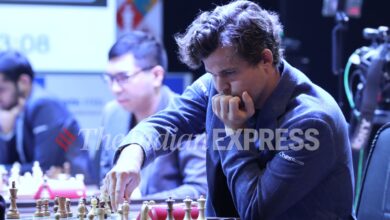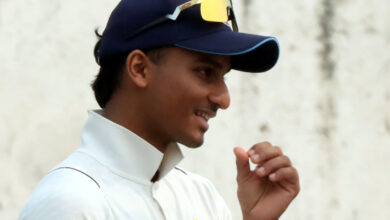Stressed and downcast Ding Liren grappling with much more than Ian Nepomniachtchi

Ding Liren looked lost. It was a fairly simple, release-the-pressure sorta question, posed a Twitter user at the press conference on Monday: “What would you be if not a chess player?”
Ian Nepomniachtchi would go first, saying how there are many teachers in his family and that he might have become one himself.
Ding thought long and hard. For 25 seconds, he struggled to think of an alternate career option before managing, “It’s hard to say”.
At the same press conference, he had been asked if he felt better while playing game 2 than he did in game 1. Once again, he could only say: “It’s hard to say”.
Monday had been a demoralising day for Ding, who had lost Game 2 to his Russian rival in 29 moves. But you needn’t look at the scoreboard to know what had happened; one look at the body language of both contenders at the post-game media interaction at Astana’s St Regis Hotel would have sufficed.
The Russian, Nepomniachtchi, was so buoyed that he was cracking self-deprecating jokes about not being able to part with snacks in his room back at the Dubai World Championship two years ago.
The Chinese challenger seemed to be in a mental turmoil, which itself is not rare for a high-stakes game like the World Championship. But while most chess players get adept at hiding their inner mental state behind poker-faced visages, Ding has dropped his guard and shown his cards at every public appearance in Astana so far.
After the first game, he had offered up an X-ray of his emotional state.
“I’m not happy with the way I played. I’m a bit depressed,” Ding admitted after Game 1. “I didn’t think about chess so much at the start of the game. My mind was very strange. Had many feelings and many memories. Strange things happened. I thought maybe there was something wrong with my mind. Maybe it was the pressure of the match.”
He even told Spain’s El Pais before the event started that he had been struggling over the last couple of years to deal with a bad break-up.
“I have to go back to being the 2019 me. Then the pandemic came and, at the same time, I had a crisis with my girlfriend and we ended up breaking up. Chess now fills my life, but I also have a good friend. She and my team of analysts pull me out of emotional slumps very well,” he told the Spanish publication before the World Championship started.
Hotel drama
Not just mentally, Ding’s preparations coming into the World Championships have faced logical challenges as well. On Saturday, just one day before the first game, he decided to pack up his luggage and move out of Astana’s St Regis because he was not happy with the room.
Viswanathan Anand, talking about Ding’s last-minute room change in FIDE’s commentary, shared an anecdote from his playing days to highlight how eccentric chess players can be.
“At the Interpolis International Chess Tournament, held in Tilburg (The Netherlands), Garry Kasparov and other players were given amazing cottages to stay in the woods. But the Russian checked out of his cottage and moved into a city hotel. Clearly a downgrade in my opinion. He moved because he couldn’t handle the quiet! But it worked! He started playing brilliantly. At that event, Kasparov broke Bob Fischer’s record for the first time (of the highest rating in chess hory, 2785).
While Kasparov’s move had worked, Ding’s clearly hasn’t.
“It is hard to imagine that Ding can play worse with white in game 2 than in game 1. If he cannot find a way to be happy and more energetic quickly, this will be a short match,” tweeted GM Susan Polgar. “Having a strong team is more than just looking for novelties. It can help put the player in the right frame of mind, mentally and emotionally.”
After a rest day on Tuesday, the third game of the World Chess Championship will be held on Wednesday.
If anyone can truly empathise with Ding at the moment, it’s probably the man across the board, Nepomniachtchi. While the Russian can now joke about snacks at the 2021 World Championships, he had an equally torrid time against Magnus Carlsen in what was his first World Chess Championship clash. After five draws in that series, Nepo had practically unravelled against the Norwegian in Game 6 and had made glaring errors in the eighth, ninth and 11th games. Game 11, the contest was over.
“These things which happened here, they have never happened to me at basically any events … In my career I lost quite some stupid games but not as many in such a (short) time,” Nepomniachtchi had said later. But that’s sport. Here, with Liren though, an unmakable vulnerability is simmering with his emotional health; Game 3 can either mark the turnaround or be the unravelling point.







